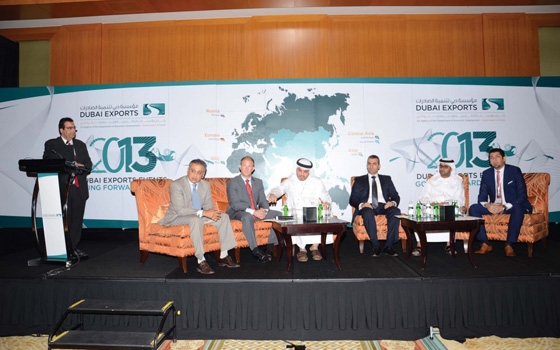Dubai Exports, the export promotion agency of the Department of Economic Development – Government of Dubai, recently organized the “Exporting Opportunities to Qatar” seminar at the Ritz Carlton DIFC Hotel in Dubai. The seminar brought together entrepreneurs, representatives of SMEs and large corporations, banks and government institutions, to present and exchange their views and experiences about conditions for exporting to the Qatari market as well as about the main opportunities this market offers.
Dr. Ashraf Ali Mahati, Export Market Intelligence Senior Manager, Dubai Exports, opened the seminar by saying, “The Qatar market offers UAE companies a huge potential to extend their exports. Also, the geographical proximity implies that firms, which are not currently exporting, can learn to do so in this market since it shares the same culture, language, standards, and similar. We hope to see a larger number of firms exporting to the country from the UAE in the next few years.”
Mohammed Al Kamali, Director of Export Market Development, Dubai Exports, started his presentation by saying, “A key element of the Dubai Exports strategy is to support the increasing trade between the UAE and Qatar during the next few years, taking advantage of Qatar’s drive to expand cooperation with UAE companies in infrastructure projects.”
He further stated that the UAE and Qatar have a long and strong relationship which is evident from the positive trade balance statistics. Namely, the UAE’s export to Qatar in 2011 amounted to USD 5.9 billion, while in 2012 it reached USD 6.8 billion.
Mohammed opined that the 10th International Trade Construction, Building, Environmental Technology & Materials Exhibition – Project Qatar, which will be held from 6th to 9th May 2013, will provide a unique platform, for UAE companies, to extend their already successful reach into the construction and building sectors in Qatar.
At the beginning of his presentation, David McGee, Global Trade Manager, HSBC Large Corporates, stated that Qatar’s main import partners are USA, China, Japan, Germany and the UAE. On the basis of HSBC’s strong presence in the Qatari market, David further added, “Qatar, KSA and Oman are three regional countries that are powering ahead. In addition to various development projects, Qatar is a huge importer which offers a lot of niche market opportunities for foreign companies.”
David highlighted three streams of opportunities within the Qatari market:
• Domestic consumption led
The opportunities arise within the regular flow of business in Qatar, and focus on the following products: machinery and transport equipment, manufactured goods, chemicals and related products, food and live animals, pharmaceuticals, beverages and tobacco, and dairy products.
• Investment led
The opportunities arise from various infrastructure projects planned in Qatar such as the metro project, Doha International Airport, Doha Port 2016, FIFA World Cup 2022, and projects related to roads, railways and utilities.
• Sustainability led
The opportunities arise for service provides in line with Qatar’s initiatives to ensure food security as well as initiatives to ensure sustainable and environment-friendly buildings (“Green building” constructions).
In his turn, Basel Amaneddine, General Manager, IFP Emirates, presented the opportunities the Project Qatar Exhibition will offer to exporters by saying, “Project Qatar 2013 is a major gateway to the construction market in Qatar and an annual forum that anyone interested in construction materials, techniques and solutions cannot afford to miss.
Ahmed Jaafir, Senior Associate, Al Tamimi & Co. – Qatar Office, pointed out that when doing business in Qatar, a foreign company needs to consider the Foreign Investment Law. Concluding on the topic, Arif Husain AL Marzouqi, Head of Research & Standardization Management Office, Acting Head of Inspection & Certification Section, Dubai Municipality, explained to the participants the importance of possessing all relevant conformity assessment certificates before exporting to a new market.
In the second part of the seminar, all speakers were part of a panel discussion and answered various questions from the audience.
Trade and Exports Middle East
18 April






















































